No one wants to go pick their child up from daycare only to find out they have been biting.
Biting can cause injury to others and can feel embarrassing to parents.
However, much like toddler hitting...biting is a very typical behavior…and if your child is biting others…you are not alone.
In this post we will go over some of the reasons young children bite and some strategies to try to alter the behavior.
Here is what I will be covering in this post:
- What Causes toddlers to bite other children and parents?
- Toddler Biting from Teething
- Toddler Biting When Excited
- Toddler Biting Due to Sensory Needs
- Toddler not talking…Could this be the trigger?
- Toddler Biting Due to Hunger or Lack of Sleep
- Toddler Biting Due to Illness
- Biting Toddlers in Daycare
- Frequently Asked Questions About Toddler Biting
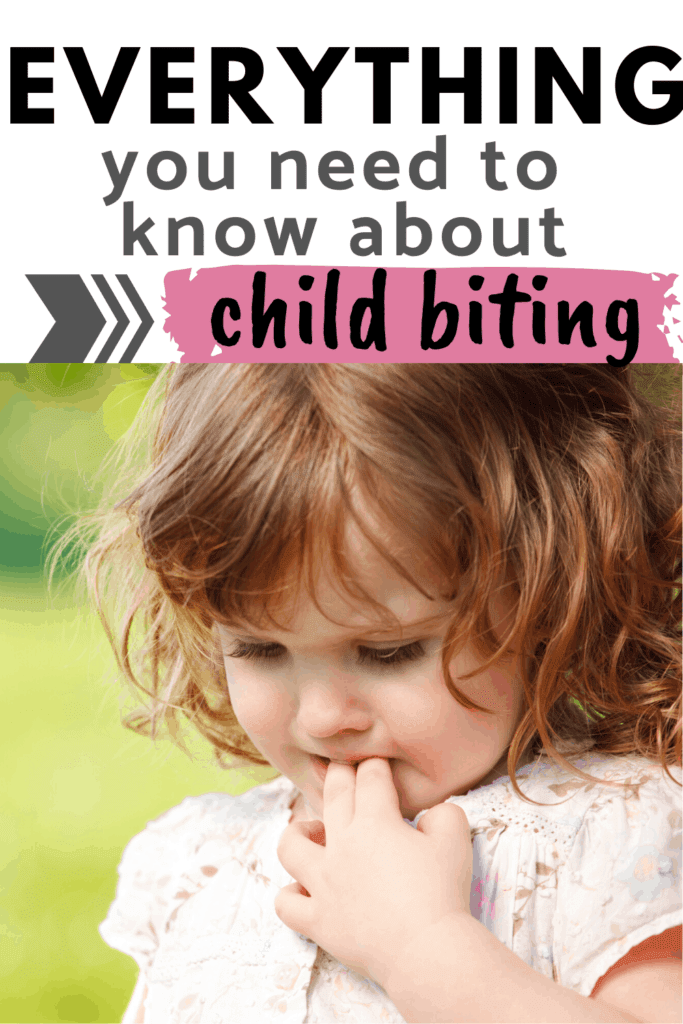
(This post contains affiliate links. To read our full disclosure policy click here.)
What causes toddlers to bite other children and parents?
Biting is a behavior…and behavior is usually triggered by something.
There are many reasons that your child could be biting so one important thing to do is to pay attention to what happens RIGHT BEFORE they bite.
Here are a few things that could cause your toddler to bite:
- Teething
- Limited language to communicate
- Unsure of how to interact with others
- Illness
- Underestimation
- Overstimulation
- Overtired
- Sensory
- Expressing their feelings
- Attention Seeking
- Frustration
- Fear
- Understanding cause and effect
- Hunger
If you can notice a pattern in the biting behavior this will help you curb it.
For example, if you notice biting tends to happen right before bedtime or in the evening your child may be doing it because they are overtired.
If you notice that your child is biting EVERYTHING insight from other people, themselves, and furniture…it could mean they are teething or are seeking it for sensory reasons.
Let’s take a look at some of the top causes of biting and how we can handle it when we know the trigger.
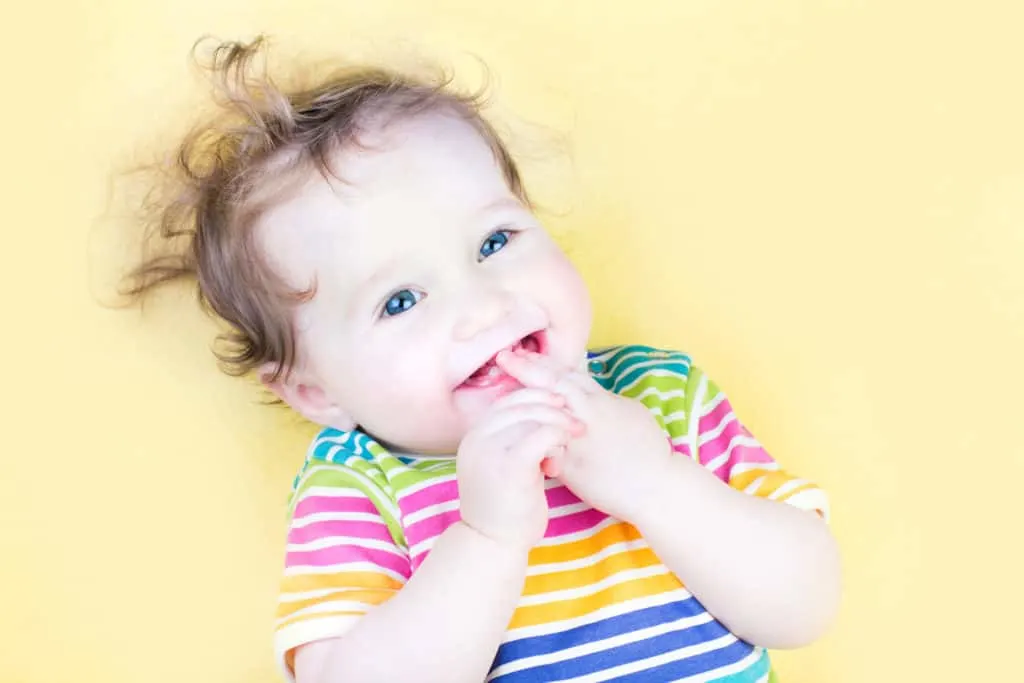
Toddler Biting From Teething
If your toddler is biting others, themselves, and objects in their environment then teething or oral sensory seeking could be the cause.
Teeth and molars come through sometimes in late toddlerhood so they could trigger some biting episodes as your child is looking to ease the pain.
You could try some teething remedies such as giving them a cold washcloth to chew or some chilly foods during meal times like slightly thawed frozen fruit or smoothie popsicles.
You can read some more about teething strategies HERE.

Grab your FREE Milestone Guide HERE.
Toddler Biting When Excited
Having a toddler that bites when they are excited can be a bit surprising although not unusual.
This may be the trigger of your toddler’s biting if you notice that he bites right after or during an exciting moment.
So what can you do in this case?
The first thing I would do is validate and label your child’s emotion.
You can do this by simply talking about what is going on and how you and they must be feeling.
I would then teach or redirect them to a behavior that allows them to express their excitement but does not harm others.
Some options I would try would be:
- Clapping
- Shouting “Hooray!”
- High Five
- Jumping
You will want to talk about the emotion of being excited with your little one ahead of time and see which option they like to use.
Reading a book about emotions (like this one) can also help your little one understand how they are feeling a bit more.
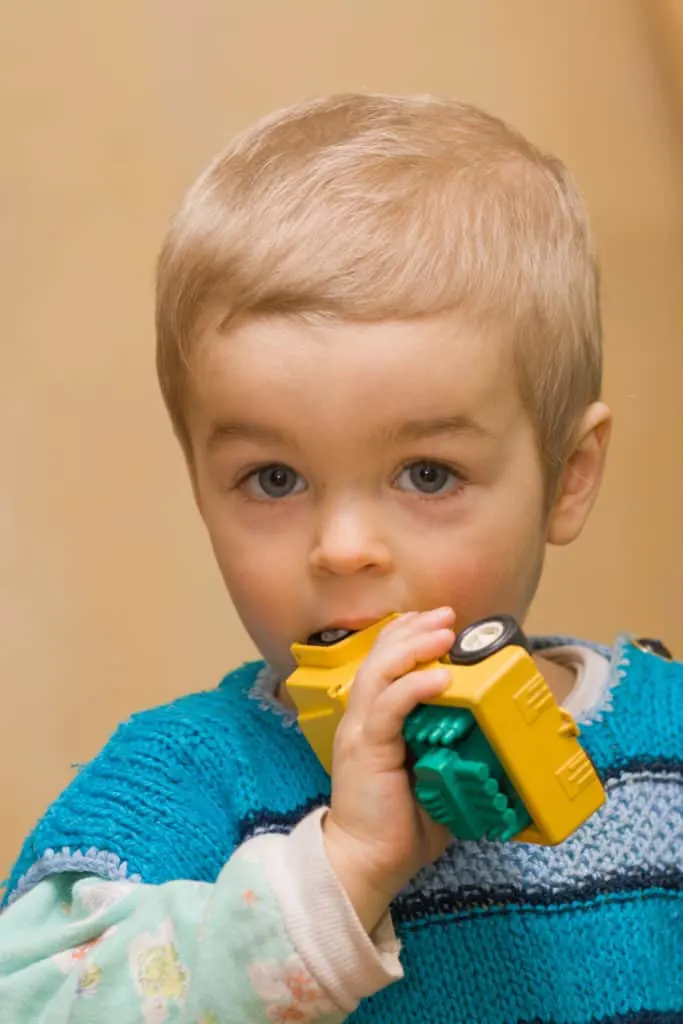
Toddler Biting Due to Sensory Needs
If your toddler is biting things very randomly and it does not seem like there is a certain event that triggers the biting episode they could be biting to fill a sensory need.
This type of biting can look very similar to biting because of teething.
If the biting is caused by a sensory need then you will want to find other ways for your little one to get that input that they need that is safe.
One way of doing this would be to offer crunchy or chewy foods more frequently.
This allows your child to get that biting input in a more functional way.
Crunchy foods could be things like carrots, apples, or pretzels.
Chewy foods can also be helpful like bagels or granola bars.
Foods with strong flavors like pickles, grapefruit, or salsa can also provide satisfaction.
Sometimes even having a toddler brush their teeth can fill that sensory need so that could be a strategy as well.
Another is providing your child with a sensory toy (like this)that they are allowed to have and chew on as they please.
@baby.toddler.teacher ##toddlertime ##toddlertip ##toddlermomproblems ##toddlerparents ##parentoftoddlerscheck ##toddlerthings ##mommystruggles ##earlychildhoodeducators ##parent
♬ Savage – Megan Thee Stallion
Toddler not talking…could this trigger biting?
If your toddler does not have words and is not able to communicate it could be the cause of biting.
Biting due to lack of communication happens often at daycares or in other social situations.
When children do not have words to interact with others they may try to interact using biting, hitting, or other behaviors that may seem aggressive.
If a lack of communication seems to be the trigger for biting then you need to help them find a way to interact with others that is safe.
Teaching children sign language can be a great way to bridge the communication gap until words come in.
Teach them signs that will help them communicate with peers such as “please”, “stop” and “my turn.”
You can also teach them things like how to give a high five so that they have a fun way to interact with others.
If you have concerns because your toddler is not talking you should contact your pediatrician or early intervention.
You can read some additional strategies for promoting language development in infants and toddlers.
Toddler Biting Due to Hunger or Lack of Sleep
Toddlers may not always know what they are feeling exactly or how to express it.
Biting can occur due to hunger or being tired as they are not able to describe those feelings to their caregivers.
If you notice that biting is happening close to nap or bedtime that indicates that they may have been overtired when the bite occurred.
You would then want to make sure that you are closely monitoring your child’s sleep cues as nap or bedtime comes closer and possibly move it up a bit if they seem to be getting overtired.
The same thing goes with biting due to hunger.
You may need to alter mealtimes or give a snack if your child seems to bite when it is near a meal or snack time.
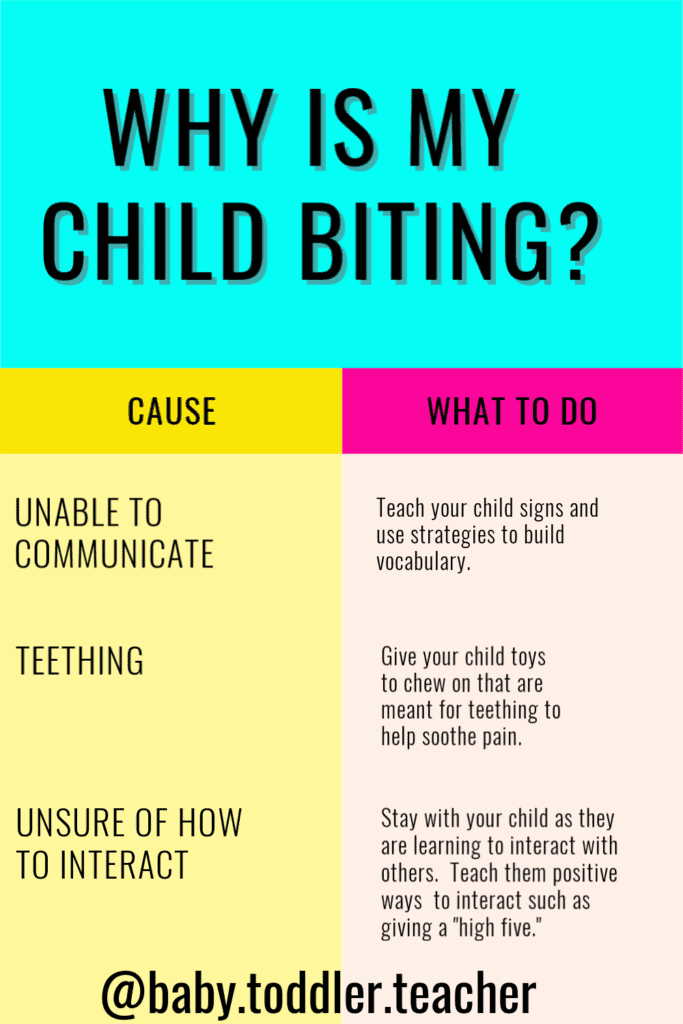
Toddler Biting Due to Illness
Just like they can have a difficult time letting you know they are hungry or tired it can also be a struggle for them to let you know they are not feeling well.
I can usually tell when either of my children is about to get sick because there is usually a huge shift in behavior.
Aggressive behaviors like biting or hitting can definitely happen more frequently when they are feeling under the weather.
Even an ear infection could cause more biting as your child may bite to try and regulate the pressure they are feeling in their ears.
Ruling out any form of sickness is important when identifying the trigger of a biting episode.
Biting Toddlers in Daycare
If your child is biting at daycare then it is essential for the daycare staff to pinpoint the biting trigger.
Ask what happened before the biting incident.
Did the bite seem random?
Was there a misunderstanding during play due to limited communication?
Was it close to lunch time?
Once the biting trigger is identified then there needs to be a plan in place with how to prevent further incidents.
This may include an action plan that you can work on at home depending on what the trigger is.
For example, if the trigger is lack of communication then working on sign language and other language building strategies at home can be done as well as at daycare.
Yes, it is normal behavior for young children under the age of 3.
Some children may bite other children, objects such as furniture, or even their parents.
You will first want to find out what the trigger or cause of the biting behavior is.
After that you will want to pick a strategy to use consistently to eliminate the behavior.
Related Posts You Will Enjoy
Social Emotional Activities for Toddlers in Childcare
Simple Math Activities for Toddlers
The Best Magazines for Toddlers
How to Calm Down a Toddler Before Bed
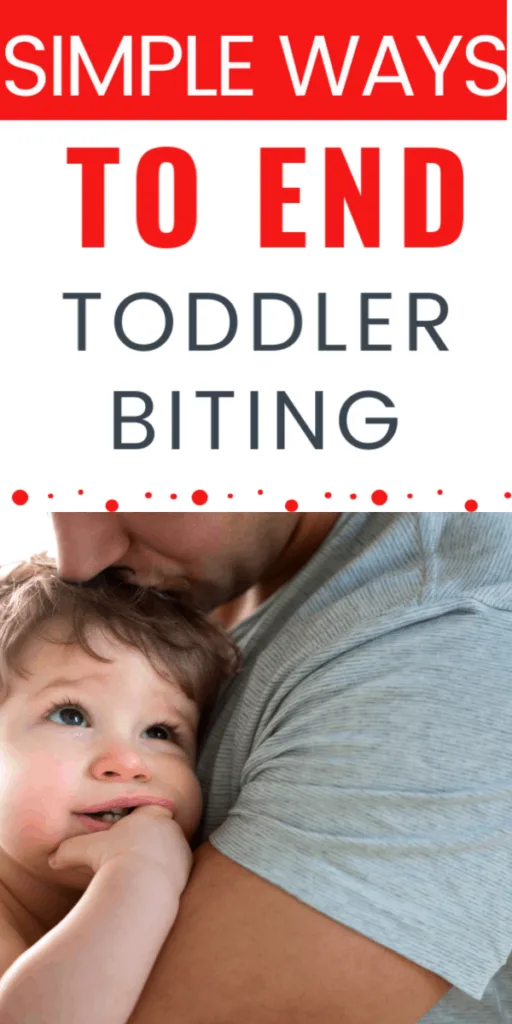

Kayla O’Neill has a master’s degree in education as well as a bachelor’s degree in special education with an emphasis in early childhood education. She has been working as a developmental therapist with babies and toddlers in early intervention since 2012. She is also a mom with two young children.